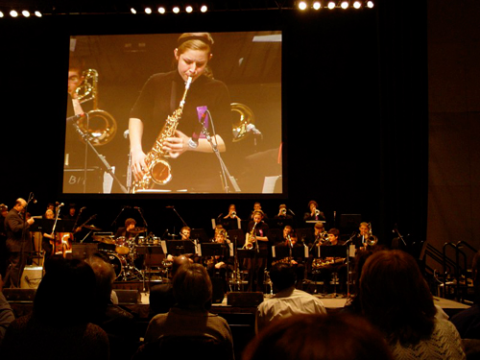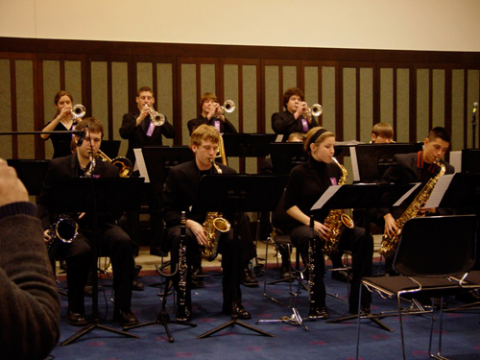Preparing for the High School Jazz Festival

Richard Guillen directs the Arlington High School jazz band at the 2009 High School Jazz Festival.

The Arlington High School jazz band performs at the High School Jazz Festival Winners Showcase Concert.

The Arlington High School jazz band performs for the judges.
Arlington High School band director Richard Guillen has taken his school's jazz band to Berklee's High School Jazz Festival nine times over his thirteen years at the school, but the last three years have been especially good for the band. Placing third, then second, then first in their class, they've been getting increasing recognition. This year they return to "defend their title," but Guillen says their focus isn't on winning, but getting as much from the experience as possible. We spoke to Guillen about his students' festival experiences; below is a condensed and edited version of that conversation.
What is it like to participate in the High School Jazz Festival?
RG: It's very exciting, because there's so much music going on. In the program Berklee lists the top three or four from each of the classes, and I encourage my students to seek them out, especially the groups that they play against directly. I also encourage them to go hear the Berklee groups, check out Berklee, check out some jam sessions, and just soak up as much as that weekend offers as possible. The more that they can get exposed to really good jazz, the better. The performance is great, and the evaluation is great, but the result is a byproduct. The idea of going there and doing well is certainly an incentive, but it's more important for the kids to go there and have a positive playing experience, get some good feedback from the judges, and hear some great groups. That's really what it's all about.
What do you think they take away from this?
RG: I think they enjoy the camaraderie of being away for the weekend and just focusing on being jazz players. They don't get that a whole lot. Our kids are immersed in all these other things. We have five concert bands; we have four orchestras—our kids are really involved. So for them just to get a weekend away with this kind of focus is fun for them.
What do you do with the students to help them prepare?
RG: The jazz band starts rehearsing usually in November. We wait until our marching band season is over, because a lot of these kids are involved in the marching band, and it's pretty strenuous scheduling-wise. I put a lot of focus on picking great music to play at Berklee, but I also try to give them a well-rounded jazz experience, playing classics and standards, and at the same time exposing them to new literature. I encourage kids to do a lot of listening outside of rehearsals, because the best way for them to learn how to play jazz is just to listen to it over and over again. We rehearse one night a week for three hours and generally focus on style. The kids are generally good readers, because they audition for the group. We do some improv workshops. We have performances in the community and in the school throughout the year. A lot of bands really only put their energy into the three or four festival tunes that they play. My goal is for my kids to be able to perform anywhere from 12 to 15 tunes a year, and to be exposed to the history of jazz. I talk a lot about how it's our American identity musically. It's grown to become this amazing thing that everyone else in the world has taken on now, but it started here.
Did your students get scholarships to Berklee's summer programs last year?
RG: We were able to send three kids. Savannah Blum, our lead alto player, went to the Five-Week Summer Performance Program. Jon Suh went to Bass Lines, and Matt Kranis went to the Percussion Festival. A percentage of the tuition was covered by Berklee, and our band boosters covered the remainder of it, so the kids didn't have to pay too much out of pocket. The kids loved the workshops; they said they would do it again in a heartbeat.
Berklee also sends a clinician to your school, and last year we were fortunate enough to have [Berklee brass professor] Phil Wilson work with the kids for a three-hour workshop. Talk about inspiring. This legendary jazz trombone player comes to your school, and he's talking about playing with Louis Armstrong... It was just the best experience for them to hear firsthand from somebody who's been through generations of jazz players. He played for the kids, and they played for him. He worked with the High School Jazz Festival group primarily, but I had my other students sit in on the workshop. That for me was probably the best thing about winning.
What's your background?
RG: This is my 21st year as a music educator. I'm a saxophone player. I love the marching band thing, and I really enjoy the concert band thing, but my teaching passion is probably jazz. It's just so amazing to give the kids the experience and the history and the style. They don't get that in their daily musical experiences. And I've really become a student of jazz. I don't consider myself an expert at all. I'm constantly learning, constantly growing, and over the years I've come to gain even more respect and knowledge for the art form than I ever thought I could. The more questions that I ask and the more listening that I do, the more I can offer my students.
Have any of your students gone on to musical careers?
RG: Two of our students who are in the group this year have applied to Berklee, and one has been accepted, so we've requested an admissions representative be there. Berklee does the audition one-on-one, so the fact that they can hear them play with their school's ensemble is pretty special. We had a kid last year go to Berklee, one of our percussionists. A lot of our kids go on to music, and a lot of our kids keep music as a really passionate hobby.
